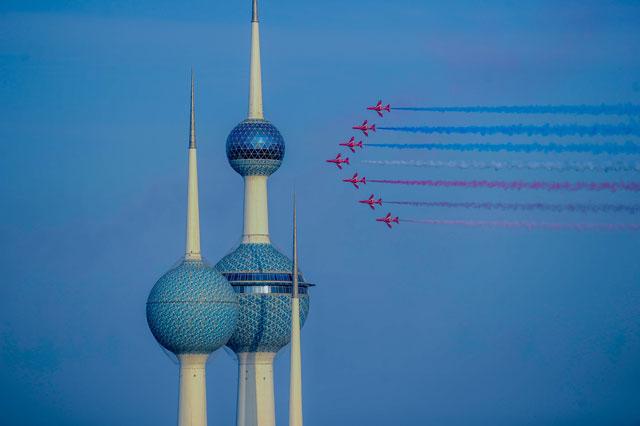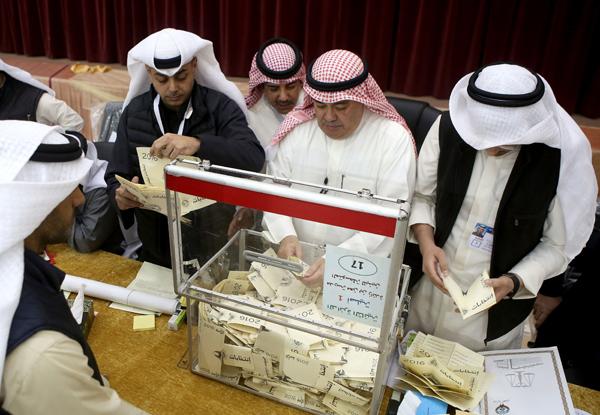You are here
Kuwait opposition ‘needs unity’ after poll comeback
By AFP - Dec 01,2016 - Last updated at Dec 01,2016

Red Arrows, officially known as the British Royal Air Force Aerobatic Team, perform a flypast in Kuwait City, Kuwait, on November 28 (Anadolu Agency photo)
KUWAIT CITY — Kuwait’s Islamist-dominated opposition made a strong showing in the Gulf state’s parliamentary elections, but analysts say the loose coalition must forge strong unity to become an effective political force.
Saturday’s polls were the first in nearly four years contested by the opposition, whose diverse components agree on some issues such as rejecting government austerity measures but are split on many others.
Political parties are banned in Kuwait, which was the first Gulf Arab state to adopt a parliamentary system in 1962.
But many groups operate freely as de facto parties. As a result, the opposition coalition is made up of individuals, rather than well-defined parties with a distinct ideology.
The opposition groups boycotted two general elections in 2012 and 2013 in protest at a change in the voting system brought unilaterally by the government.
But they decided to contest the November 26 snap polls to stop what they called a “political deterioration” in the oil-rich emirate.
“The opposition is not a single entity. It is a coalition of groups and individuals not linked by a distinct ideology or even a programme,” said political analyst Abdulwahed Khalfan.
“They differ in their directions and goals but they meet under a common umbrella of opposing the government,” Khalfan told AFP.
Islamists took nearly half of the 24 seats won by the opposition in the 50-member parliament. The rest went to nationalists and liberals.
The main Islamist group is the Muslim Brotherhood-linked Islamic Constitutional Movement (ICM) which won six seats along with its allies.
The radical Salafists and their supporters won five seats.
“I think we will see more than one opposition bloc in parliament... Not all opposition members can be classified under one category,” political analyst Saleh Al Saeedi said.
“They will agree on a number of priority issues... On populist issues, their number will increase as other MPs will join,” Saeedi told AFP.
United against austerity
For example, a large number of MPs will join the opposition in rejecting government austerity measures and raising prices, motivated by popular pressure.
Some leading opposition lawmakers have already pointed to a number of urgent issues they want to tackle when parliament holds its inaugural session on December 11.
Opposition MPs held their first coordination meeting on Wednesday and discussed fielding a candidate for the post of parliamentary speaker as well as their political agenda.
They agreed in principle that their priorities are to address revocations of citizenship, opposing austerity measures and the scrapping of freedom-curbing bills issued by the previous pro-government parliament.
They plan to hold more meetings next week.
“There is no alternative for MPs but to reach an understanding on the basis of joint national commitments,” veteran Islamist opposition MP Jamaan Al Harbash wrote on his Twitter account earlier this week.
“We must put aside any controversial issues to ensure the success of agreed national topics,” Harbash said.
During its heyday in 2011-2014, the opposition held massive street protests demanding wide democratic reforms, an elected government and broad constitutional changes that would effectively restrict the powers enjoyed by the ruling family.
Those demands are no longer a priority for the opposition which has been weakened and several of its leaders and activists jailed.
While parliament has the power to vote the prime minister and Cabinet members out of office, the Kuwaiti political set-up means change is not easy.
The country has the Gulf’s oldest elected parliament, but under the constitution the emir has extensive powers and can dissolve the legislature at the recommendation of the government.
Ruling family members occupy the key portfolios of defence, foreign and interior.
In addition, unelected ministers become members of parliament with almost similar powers to those of elected MPs, giving the government an edge.
“The opposition’s strength and capability will hinge on its unity and cooperation,” Saeedi said.
Related Articles
KUWAIT CITY — The Kuwaiti Cabinet on Monday submitted its resignation to the emir of the oil-rich Gulf state following snap parliamentary po
KUWAIT CITY — Kuwait's Emir dissolved parliament on Sunday following tensions between lawmakers and the government over a petrol price hike,
Kuwait’s parliament on Thursday accepted the resignations of five MPs who quit because the pro-government chamber refused to question the prime minister about allegations of corruption and mismanagement.



















